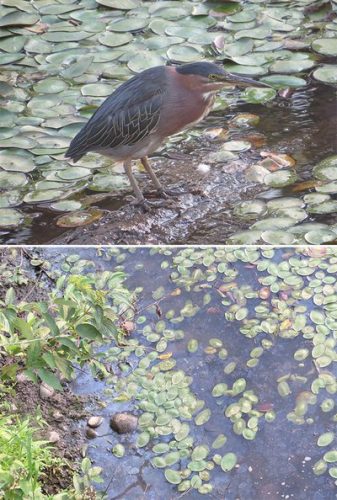
Park goers might have noticed an oily sheen hugging the banks of Delta Ponds these past few weeks, oozing only a few wing flaps away from the hunting green herons and basking Western pond turtles that frequent the wetlands across from Valley River Center. Don’t worry, says Jonathan Wilson, a stormwater regulatory compliance coordinator for the city of Eugene — it’s just a natural form of shiny bacteria.
“Although it looks like an oil sheen, it is actually a naturally occurring bacteria that forms in stagnant water,” Wilson writes in an email to EW. He says that at this time of year, when water levels are low and the pond loses its inflow and outflow, bacteria begin to accumulate on the surface of the undisturbed pond water. The material should more or less disappear by the end of November.
According to the United States Geological Survey and the Minnesota Pollution Control Agency, some forms of bacteria produce oil-like films as they react to the presence of iron and manganese in the water.
As sunlight hits the film, the light reflects, creating an oily appearance. The color of the sheen depends on what mineral the bacteria is taking out of the water. The bacteria are not considered a contaminant, although the presence of the sheen is sometimes associated with blue-green algae, which Wilson says he did not observe at Delta Ponds.
Wilson says that in order to tell if you’re seeing oily-looking bacteria or petroleum, throw a small object such as a stick into the water. “If after disturbance the sheen breaks up in chunks, it is bacteria. If the material coalesces back together, it is most likely oil,” he says.
Wilson also says that the city has found oil in Delta Ponds in the past, coming from a vehicle with a burst hydraulic line, so he encourages reports of potential pollution. The city has an employee dedicated to spill response, as well as additional staff available for backup. “We’d much rather hear about a hundred things that turned out not to be an issue than miss one that was,” he says.
To report a possible environmental contaminant, contact the city of Eugene Public Works Department at 682-4800.